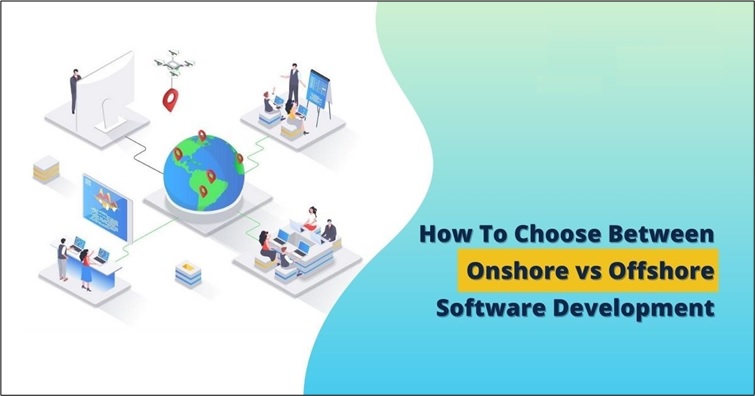Onshore vs. Offshore Software Development: How to Decide Between Both Approaches
Hire a software development team within proximity to work on a project or outsource it to a team overseas – that’s a question that every business with an innovative digital product idea faces. There is a lean toward outsourcing software development as it promises high-quality work at a reduced cost. The global IT outsourcing market is expected to reach $397.6 billion by 2025, at a growth of 4.5%.
However, onshore and offshore developments have upsides and downsides, and it is essential to compare both to ensure you don’t make a wrong decision.
In this blog, we’ll compare both onshore and offshore software development in detail so you can easily decide based on your project requirements. Let’s begin:
What is onshore software development?
In onshore software development, a company hires additional staff from their country to help with the project. It can mean hiring a single freelancer or a nearby software development firm. Companies choose onshore software development because they feel hiring an outsourcing partner from their country can eliminate language/culture barriers.
Pros of onshore software development
Here are a few upsides of onshore software development:
1. Real-time Collaboration
Time zone differences are fundamental, making it difficult for you to collaborate with your outsourcing partner. To clear even the slightest confusion, you have to wait for hours.
Since you share the same business hours with your onshore software development outsourcing partner, communication becomes more streamlined. If there’s an issue or confusion, you can drive to their office and have a good old-fashioned meeting. Offshore outsourcing doesn’t offer the same perks.
The real-time collaboration option in onshore software development ensures you can fix all the issues on time and apparent confusion with your outsourcing partner and build a high-quality product.
2. Language is not a barrier
Like time zone differences, businesses also face language barriers in outsourcing that drastically affect the quality of your project.
Let’s understand this with the help of an example:
The language challenges will be immense if an English-speaking company outsources a project to China. You can hire a translator, but the communication gaps will impact your performance. Implementing agile will be a difficult task!
Onshore software development outsources eliminates these barriers and ensure you can seamlessly complete all the tasks on time. Miscommunication or slowed response time are no longer barriers as your in-house and remote teams can promptly contact each other.
3. Regulations and compliances are not concerns
Every country has regulations that every business should comply with, such as labor, taxation, and intellectual property laws. Often these regulations are tricky and get in the way of running a business smoothly. Onshore outsourcing ensures you don’t have to worry about these concerns and can finish your work on time.
4. Local developers understand the local market well
Another benefit of outsourcing onshore software development is that local developers understand the need better than someone who lives overseas and relies solely on reports. Hence, they better know what your audience likes and what it doesn’t – thus helping you build a product that resonates with them.
Cons of onshore software development
1. You’ll have to pay more
Hiring a local software development agency means you’ll have to spend more out of pocket. Especially companies from countries like the United States and Western Europe charge much higher than their Indian, East European, and Chinese counterparts. You’ll also have to pay a premium to work with these developers.
2. You’ll have access to a reduced talent pool
When you’re outsourcing internationally, you have access to global talent. But when you hire someone from your home country, you’ll have access to a limited talent pool. As a result, you’ll reduce your chances of hiring decent software developers.
What is Offshore Software Development?
Offshore software development is the opposite of onshore software development, in which a company outsources its project to an overseas company. In layperson’s terms, offshore software development means companies from the US outsourcing to companies from China, Eastern Europe, India, or South America.
Pros of offshore software development
1. Low costs
Offshore software development is generally less expensive because of factors like lower cost of living and a competitive market. You can get a project done at around 10-20% of the onshore price and get the same quality.
2. Access to a larger talent pool
Outsourcing offers access to worldwide talent, i.e., professionals from different backgrounds and technological expertise. It means you can easily find an extended team of skilled and affordable developers that you could barely find if you looked closer to home.
3. Round-the-clock Production Work
Outsourcing may involve working with professionals in a distant time zone. If you’re a product development company that has outsourced its QA testing services, the QA team you’ve hired can test the code you built during the day. This way, you can move things on a 24-hour cycle and release software faster.
Cons of offshore outsourcing
1. Language barrier
While English is widely spoken worldwide, it’s still a second language in countries like China and Eastern Europe. As a result, your team may not be as proficient in it – making it challenging for you to communicate your project details. Even with a translator, communication goes haywire and often results in projects that don’t meet your expectations.
2. Lack of real-time collaboration due to time-zone differences
There is a 9-hour 30 min time difference between USA and India. It means that when someone in the US starts their day in the office, it’s time for their Indian team to wrap up their work. As a result, even simple tasks like making a call become difficult.
This lack of collaboration takes a toll on the quality of your project. Let’s understand this with the help of an example:
You want your outsourcing team to change your project’s code. Since it’s 10 PM at your place and your outsourced team might not be in the office, you send an email. The next day the team receives the email and spends a day fixing it. They email you since you can’t review them due to time differences. The next day you saw the email and approved the changes.
You saw what happened? Implementing a small change that you could fix in 2-3 hours took 2-3 days. As a result, your timelines stretch, and you often need more budget.
3. Cultural differences
While diversity between cultures should be celebrated, it can significantly impact the quality of your project. It is because different cultures have different ways of perceiving and solving problems, which can create gaps in work ethics, communication, and overall expectations.
4. Low cost doesn’t always mean high value
Just because you can build a product at an affordable price doesn’t mean it would also be high value. You may initially save a few bucks on your project but waste your money if you don’t get a solid return on investment.
Which one should you choose between Onshore and Offshore Software Development?
Answering this question is difficult because each development approach has pros and cons. The best way to determine between these two approaches is to consider the following factors:
1. Budget
How much money can you spare on the project? If budget is not a concern, you can hire a nearshore software development company and get a great product. However, if you’re on a tight budget, you must go onshore, as you can get a product done for 10-20% of the onshore software development cost.
2. Collaboration requirements
Do you prefer controlling your product’s development and frequently attending live, real-time meetings? If yes, you should consider onshore software development or hire an offshore software development partner who can adapt to your hours.
3. Timeline
Do you want to get your product in the market faster? If so, you must go with an offshore partner, as they can quickly turn things around for you.
Hopefully, you now have a fair idea of which one you must choose among these approaches. If you still want to know something about Onshore and offshore software development, please let us know in the comments. Best of luck!



